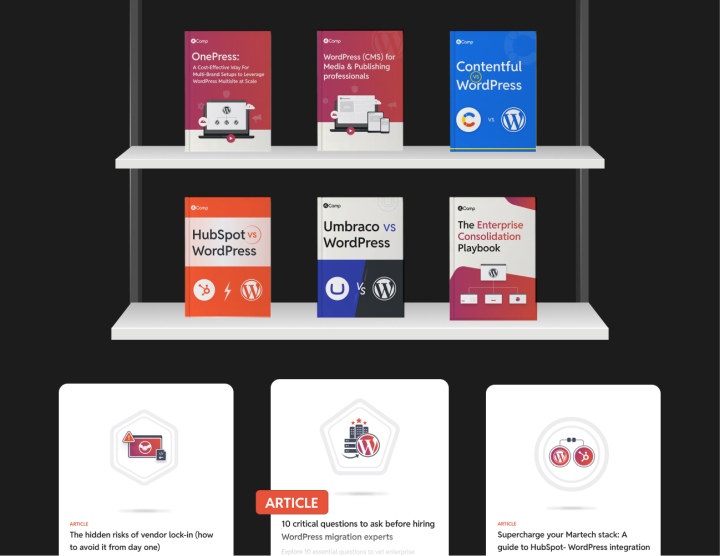Enterprise websites demand a robust web infrastructure that excels in security, affordability, scalability, and flexibility while seamlessly managing sudden spikes in traffic without compromising the user experience. The vast options of content management systems (CMSs) available in the market make it challenging to choose a suitable one.
This blog post lists the benefits of migrating to WordPress CMS and explains why it is a better choice over proprietary or custom CMSs.
The first question that naturally arises is whether WordPress, despite being a popular CMS, is truly capable of meeting the complex requirements of enterprise-level businesses. Well, let’s see some statistics to start with.
WordPress is used by 43.1% of all websites available on the Internet. These websites include media groups, non-profits, e-commerce, education institutions, and corporations, among others. Also, Walt Disney Company, BBC America, Rolling Stones, Sony Music and many others, run their websites using enterprise WordPress.
This level of widespread adoption demonstrates the versatility and scalability of WordPress. However, to make an informed decision, it’s essential to know more.
Issues With Custom CMSs
Initially, the custom CMS aligns perfectly with operational and user requirements. Nevertheless, as needs evolve, continuously updating the custom CMS becomes a significant financial overhead and time-consuming task.
Moreover, adopting an in-house CMS imposes additional burdens, such as the need to train new staff in its usage and maintain documentation and resources for internal assistance as external support is unavailable. Additionally, implementing any new functionality can take several weeks or even months to complete. Most off-the-shelf content management systems (CMS) are optimized for search engine optimization (SEO), but you need to take care of SEO yourself when using a custom CMS if you want your website to get traffic.
You also need an in-house development team to maintain and update the developed CMS. Other challenges of using a custom CMS include maintaining its speed and efficiency without sacrificing the front-end experience. You also need to be responsible for addressing the constant changes in UI/UX and user requirements on your own.
Issues With Proprietary CMSs
Despite the dedicated support, security, and trust offered by a proprietary CMS, using it for your website comes with some drawbacks. One of the main issues is that you often end up paying for features you may not even utilize.
Additionally, you face limitations in adding custom functionalities tailored to your specific needs, and if you require something highly specific, you’ll have to pay the vendor additionally. Moreover, proprietary CMSs tend to be bloated and difficult to use.
If you encounter dissatisfaction with the vendor or developers, migrating your website becomes a cumbersome process, involving rewriting the code and sometimes even redesigning the entire theme from scratch. The scalability of your website may be hampered, impeding its growth potential.
Why Migrate to WordPress CMS?
There are other open-source CMS available, such as Drupal and Joomla. However, they both have their own limitations. To name some, a steep learning curve, security issues, a complex user interface, limited plugins, and CMS not optimized for SEO.
However, you can go through the benefits of migrating to WordPress to make an advised decision.
Benefits of Migrating to WordPress

Secure for All Enterprises
There has been a common misconception that WordPress is not a secure platform. Had that been true, we wouldn’t have seen whitehouse.gov move from Drupal to WordPress CMS.
As an open-source platform, WordPress benefits from the vigilance of numerous contributors who keep an eye out for security vulnerabilities. To ensure the security aspect of this CMS, a dedicated WordPress Security Team is in place. There are constant updates and security patch releases to prevent websites from being vulnerable.
Moreover, you have the option to protect your website from malware attacks by utilizing various security plugins. The security team will not have nightmares maintaining your website with WordPress in place.
Scalable to Handle Business Growth
WordPress websites are scalable. You can expand your website seamlessly alongside the growth of your business and audience. You can easily incorporate additional functionalities, customize themes, add new pages, invite more editors and writers to collaborate, and even enable multisite support.
Businesses can add features such as e-commerce, membership, or LMS functionality as and when they expand. Furthermore, WordPress can be optimized for performance by using caching plugins, optimizing images, and minifying CSS and JavaScript files. This can help to ensure that a WordPress website can handle a large amount of traffic without slowing down. This makes it convenient to scale without impacting the performance.
Easy Collaboration With Efficient User Management
WordPress supports multiple user roles (Administrator, Editor, Author, Contributor, etc.), each with varying levels of access and permissions. This allows teams to collaborate efficiently, with controlled access to different website sections. Granular permissions and restrictions for different groups enable them to fulfil their roles smoothly, making collaboration easy.
Ease of Integration With Extensive Plugins
WordPress offers extensive integration options through plugins. This allows you to tailor your website based on specific requirements. You have the freedom to incorporate multiple plugins as desired. With an impressive library of over 50,000 plugins available, you can easily find the ones that suit your requirements.
This eliminates the need to invest large sums of money in resources to add functionality to your website. Enterprises can also opt for paid plugins that come with added support.
SEO Friendly for Enterprise Websites to Rank Better
It is important for enterprise websites to rank on search engines, and WordPress helps with SEO to rank better. WordPress is crafted using top-notch code featuring semantic markup. There is also optimized URL structure, tags, and categories that come built into WordPress. Therefore, websites using the WordPress CMS rank higher in search engines.
Along with it, there are plugins that help with SEO, such as AIOSEO, RankMath, WP Rocket, Yoast, and many more. These solutions offer numerous features to optimize both on-page and off-page SEO factors.
This benefit can be used by marketing teams to generate analytics, perform SEO and make sure the pages and posts rank on Google searches.
Easy to Use for Everyone and Anyone
WordPress offers a user-friendly experience, making it effortless for anyone to navigate through various options and complete tasks without requiring coding skills. The intuitive dashboard allows the content and marketing teams to easily update content and manage pages using the Gutenberg block editor. Even new members of your organization can quickly grasp WordPress and start their tasks without extensive training.
Keeping your website up-to-date with the latest features and security fixes is as simple as clicking a button. Since WordPress is an open-source platform, the community surrounding it is vibrant and supportive. Users can access a wealth of resources, tutorials, and assistance from the community, making the journey with WordPress even smoother.
Multisite and Multilingual Support to Reach Global Audience
Enterprise websites often utilize a network of subdomains or microsites for management purposes. With WordPress’s multisite support, you can efficiently handle multiple websites using a single WordPress installation. This enables you to effortlessly propagate changes and updates to all subdomains and microsites.
Additionally, WordPress offers plugins that facilitate multilingual support for your website, making it convenient to cater to users from various countries worldwide.
Free, Open-source, and No Vendor Lock-ins – Cost Benefits for Enterprises
WordPress, being an open-source platform, liberates users from vendor lock-ins. You don’t need to pay any subscription fee or purchase a license to use WordPress. With WordPress, there will be no licensing costs pill ups for the IT team.
You only need to pay for the domain name and hosting platform to run your website. This grants you the freedom to adapt and tailor WordPress to suit your specific needs, harnessing its full capabilities.
Additionally, a wealth of free plugins and themes are at your disposal, although it’s crucial to ensure you obtain these from reputable sources to maintain security and reliability. You also get complete ownership and control over your website because of its open-source nature.
Easy and Free Upgrades
Upgrading to a newer version of a CMS can be a complex process with some systems, requiring manual changes to your website’s code and configuration. In some cases, you may even be charged to upgrade. However, WordPress makes the process of upgrading easy and straightforward. With just a few clicks, you can update your website to the latest version, without any additional charges or licensing requirements.
Additional Benefits of Using WordPress CMS
- Mobile optimization
- Frequent updates with new features and enhancements
- Community support
- Options to choose from multiple agencies and developers
- Agencies to help with WordPress migration services
WordPress During Recession
Over the years, WordPress has experienced substantial progress in its features, functionalities, and overall improvements, expanding its usage beyond mere blogging websites.
In summary, WordPress CMS offers a robust and versatile solution for enterprise websites. Its widespread adoption, open-source nature, security measures, scalability, ease of use, and extensive plugin support make it the ideal choice for businesses seeking a powerful web infrastructure without spending more. Migrating to WordPress unlocks numerous benefits, ensuring a seamless user experience and driving growth potential for enterprises.
These aforementioned benefits have even greater significance in times of economic recession, as they serve as strategic resources for all the teams. By embracing WordPress, enterprises can maintain their online presence while managing financial outlays.
Links: Optimize, Revamp, and Migrate: Unlocking Growth for Web Publishers | Custom patterns & blocks with a performant website for Summer Works | 49% more leads with UI/UX refresh & VIP migration for Ready Logistics
On this page








Leave a Reply